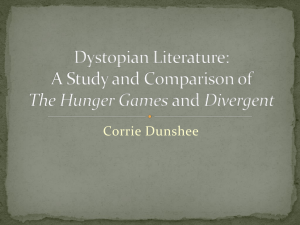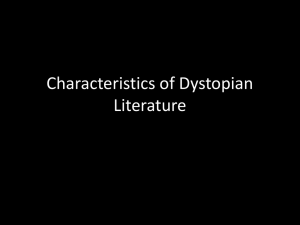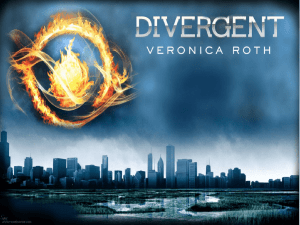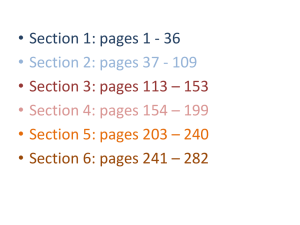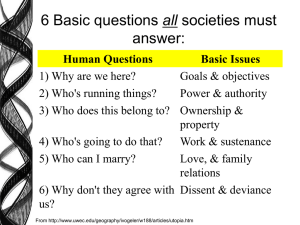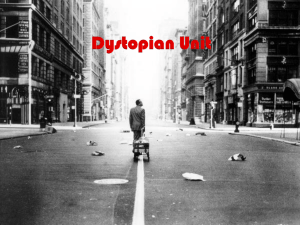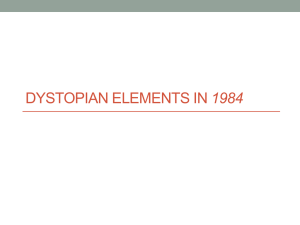Assignment and RUBRIC
advertisement
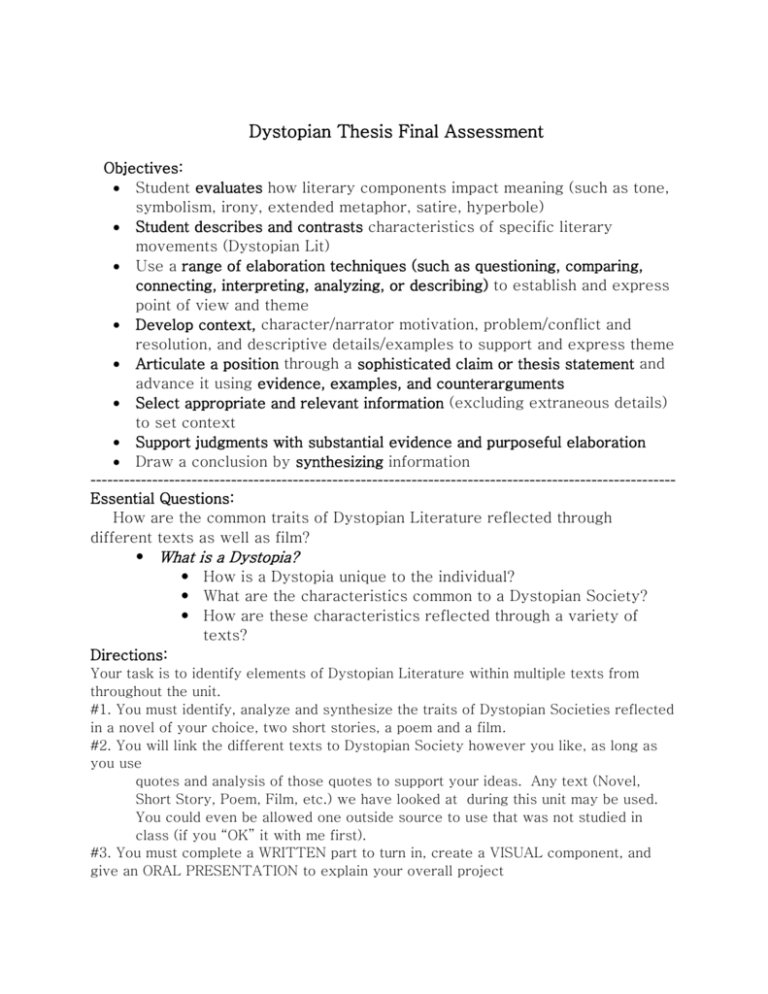
Dystopian Thesis Final Assessment Objectives: Student evaluates how literary components impact meaning (such as tone, symbolism, irony, extended metaphor, satire, hyperbole) Student describes and contrasts characteristics of specific literary movements (Dystopian Lit) Use a range of elaboration techniques (such as questioning, comparing, connecting, interpreting, analyzing, or describing) to establish and express point of view and theme Develop context, character/narrator motivation, problem/conflict and resolution, and descriptive details/examples to support and express theme Articulate a position through a sophisticated claim or thesis statement and advance it using evidence, examples, and counterarguments Select appropriate and relevant information (excluding extraneous details) to set context Support judgments with substantial evidence and purposeful elaboration Draw a conclusion by synthesizing information -------------------------------------------------------------------------------------------------------Essential Questions: How are the common traits of Dystopian Literature reflected through different texts as well as film? What is a Dystopia? How is a Dystopia unique to the individual? What are the characteristics common to a Dystopian Society? How are these characteristics reflected through a variety of texts? Directions: Your task is to identify elements of Dystopian Literature within multiple texts from throughout the unit. #1. You must identify, analyze and synthesize the traits of Dystopian Societies reflected in a novel of your choice, two short stories, a poem and a film. #2. You will link the different texts to Dystopian Society however you like, as long as you use quotes and analysis of those quotes to support your ideas. Any text (Novel, Short Story, Poem, Film, etc.) we have looked at during this unit may be used. You could even be allowed one outside source to use that was not studied in class (if you “OK” it with me first). #3. You must complete a WRITTEN part to turn in, create a VISUAL component, and give an ORAL PRESENTATION to explain your overall project (1.1) Effective speaking in formal and informal settings requires appropriate use of methods and audience awareness Task-Specific Rubric- Standard 1.1 3.5-4.0 2.5-3.0 1.5-2.0 Analyze and present information, findings, and supporting evidence, conveying a clear and distinct perspective, such that listeners can follow the story and identify relevant themes. Make excellent strategic use of a digital media in presentations to exceptionally enhance understanding of Dystopian Literature. Present information, findings, and supporting evidence, conveying a clear and distinct perspective, such that listeners can follow the story and identify themes Make strategic use of digital media in presentations to enhance understanding of the Dystopian Literature. Present superficial information, findings, and supporting evidence, conveying a clear and distinct perspective, such that listeners can follow the story and identify themes Make limited use of digital media in presentations to enhance understanding of the Dystopian Literature. (3.1) Style, expressive language, and genre create a well-crafted statement directed at an intended audience and purpose. Task-Specific Rubric- Standard 3.1 3.54.0 2.53.0 1.52.0 Use a wide range of elaboration technique to establish and express point of view and theme; the student incorporates themes related to Dytopian Fiction Create an exceptionally clear and coherent, logically consistent structure appropriate to Dystopian Literature Analyze and develop context, character/narrator motivation, problem/conflict and resolution, and descriptive details/examples to support and express themes related to Dystopian Literature Five texts analyzed (novel, 2 short stories, poetry, film) 3 quotes/examples from each text 3 in-depth analysis of each quote/example and how it links to Dystopian Fiction Use a range of elaboration technique to establish and express point of view and theme; the student incorporates themes related to Dytopian Fiction Create a clear and coherent, logically consistent structure appropriate to Dystopian Literature Analyze and develop context, character/narrator motivation, problem/conflict and resolution, and descriptive details/examples to support and express themes related to Dystopian Literature Five texts analyzed (novel, 2 short stories, poetry, film) 3 quotes/examples from each text 3 in-depth analysis of each quote/example and how it links to Dystopian Fiction Use a limited range of elaboration technique to establish and express point of view and theme; the student incorporates themes related to Dytopian Fiction Create an unclear and incoheren structure not appropriate to Dystopian Literature Rarely analyzes and develop context,s character/narrator motivation, problem/conflict and resolution, and descriptive details/examples to support and express themes related to Dystopian Literature Fewer than five texts analyzed (novel, 2 short stories, poetry, film) 3 quotes/examples from each text 3 in-depth analysis of each quote/example and how it links to Dystopian Fiction (3.3) Standard English conventions effectively communicate to targeted audiences and purposes Task-Specific Rubric- Standard 3.3 3.5-4.0 2.5-3.0 1.5-2.0 0.5-1.0 Consistently follow the conventions of standard English to write varied, strong, correct, complete sentences Consistently and deliberately manipulate the conventions of standard English for stylistic effect appropriate to the needs of a particular audience and purpose Follow the conventions of standard English to write varied, strong, correct, complete sentences Deliberately manipulate the conventions of standard English for stylistic effect appropriate to the needs of a particular audience and purpose Sometimes follow the conventions of standard English to write varied, strong, correct, complete sentences Sometimes manipulate the conventions of standard English for stylistic effect appropriate to the needs of a particular audience and purpose Does not meet the standard Standard (3.2): Elements of persuasive texts can be refined to influence an audience Grade 3.5-4 DOK 4 2.5-3 DOK 3 1.5-2 DOK 1& 2 Task-Specific Clarification for Essay Questions The student will write an analysis which reflects and analyzes the characteristics of Dystopian Literature found in all 5 texts/films The student will include an exceptionally clear thesis that relates to our big idea and analyzes and synthesizes the characteristics of Dystopian Lit found in all five texts The student will include at least three reasons, details, or facts that demonstrates clear support and understanding of dystopian lit for EACH text. The student will include an in-depth analysis for each quote and example related to each text. The student will include a concluding paragraph that synthesizes (summarizes and analyzes) the topic or main idea of the essay. The student will write an analysis which reflects on the characteristics of Dystopian Literature found in all 5 texts/films The student will include a clear thesis that relates to our big idea and analyzes the characteristics of Dystopian Lit found in all five texts The student will include at least three reasons, details, or facts that demonstrates clear support and understanding of dystopian lit for EACH text. The student will include an in-depth analysis for each quote and example related to each text. The student will include a concluding paragraph that synthesizes (summarizes and analyzes) the topic or main idea of the essay. The student will writes a summary which reflects on the characteristics of Dystopian Literature found in all 5 texts/films The student will include a thesis that relates to our big idea and analyzes the characteristics of Dystopian Lit found in all five texts The student will include fewer than three reasons, details, or facts that demonstrates clear support and understanding of dystopian lit for EACH text. The studen does not include an in-depth analysis for each quote and example related to each text. The student will include a concluding paragraph that synthesizes (summarizes and analyzes) the topic or main idea of the essay.
